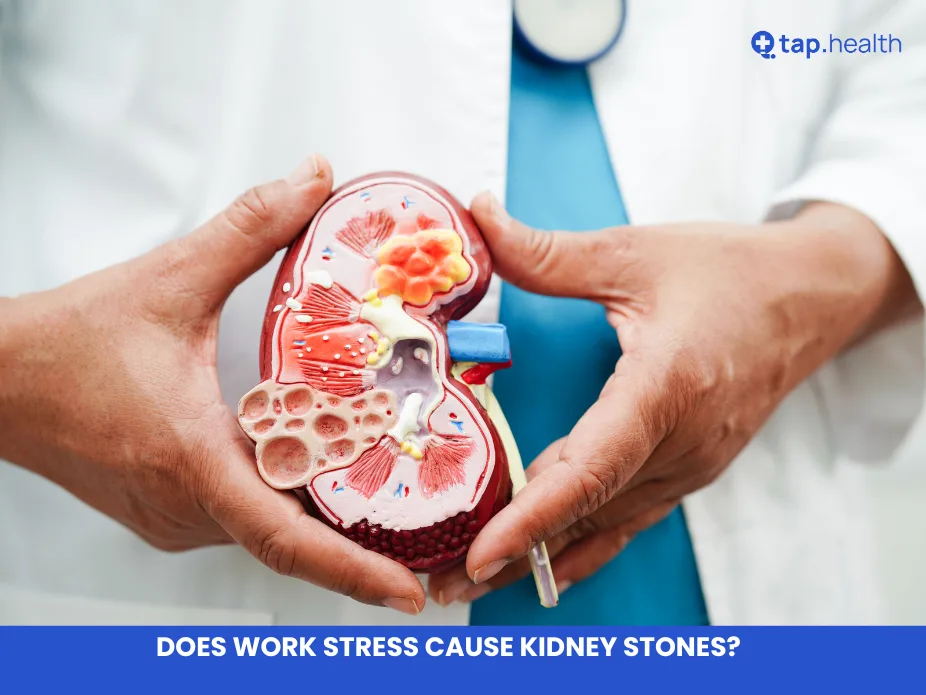In today’s fast-paced world, work stress is almost inevitable. Deadlines, meetings, and long hours can take a toll on your physical and mental health. But can work stress go so far as to cause kidney stones? While stress itself may not directly lead to kidney stones, it can contribute to behaviors and conditions that increase the risk. Let’s explore the connection between work stress and kidney stones, hear real-life experiences, and get advice from experts.
What Are Kidney Stones?
Kidney stones are hard deposits made of minerals and salts that form in the kidneys. They can range in size from a grain of sand to a golf ball and can cause severe pain when passing through the urinary tract.
Common Causes of Kidney Stones
- Dehydration: Lack of water intake concentrates minerals in the urine.
- Diet: High salt, sugar, and protein diets can increase the risk.
- Medical Conditions: Certain conditions like gout or urinary tract infections.
- Lifestyle Factors: Sedentary behavior or inadequate hydration due to a busy schedule.
Now, let’s dive into how work stress might play a role.
How Work Stress Might Contribute to Kidney Stones
Work stress itself doesn’t create kidney stones, but it can lead to habits and conditions that increase your risk. Here’s how:
1. Dehydration from Neglecting Water
When you’re busy at work, it’s easy to forget to drink water. Dehydration concentrates minerals in your urine, which can lead to stone formation.
2. Poor Dietary Choices
Stress can lead to comfort eating or grabbing quick, unhealthy meals. High salt and sugar consumption, common in fast food, can increase the risk of kidney stones.
3. Elevated Cortisol Levels
Chronic stress raises cortisol, the body’s stress hormone. Elevated cortisol can affect kidney function and contribute to imbalances that may promote stone formation.
4. Sedentary Lifestyle
Long hours at a desk mean less physical activity, which can reduce the circulation of calcium and other minerals, increasing the risk of stone buildup.
5. Increased Risk of Infections
Stress can weaken your immune system, making you more prone to infections like urinary tract infections (UTIs), which are linked to kidney stones.
Read also this – does ivf cause cancer
Real-Life Scenarios: The Impact of Work Stress
Let’s hear from people who’ve faced this challenge.
Vikram, a 38-year-old IT professional in Bangalore, recalls how long hours and back-to-back meetings left him with little time for water breaks. “I started experiencing sharp pain in my back and had no idea what it was. The doctor told me I had a kidney stone caused by dehydration.”
Similarly, Neha, a teacher from Pune, noticed she was snacking on salty chips and sugary drinks to manage her work stress. “I thought I was just tired, but it turned out my eating habits were contributing to kidney stones.”
These examples show how stress-related behaviors can indirectly lead to kidney stone formation.
Expert Contributions: Insights from Healthcare Professionals
Dr. Ramesh Patel, a nephrologist in Mumbai, explains, “Stress doesn’t directly cause kidney stones, but it creates an environment where stones are more likely to form. Dehydration, poor diet, and lack of physical activity are key factors, and these often accompany chronic work stress.”
Dr. Patel recommends stress management techniques, saying, “Simple changes like staying hydrated, eating a balanced diet, and taking short breaks to stretch during work hours can significantly reduce your risk.”
For more tips, visit Dr. Patel’s clinic page.
Recommendations Grounded in Proven Research and Facts
If you’re worried about work stress contributing to kidney stones, here are some proven tips to reduce your risk:
1. Stay Hydrated
- Drink at least 8–10 glasses of water a day.
- Keep a water bottle at your desk as a reminder to stay hydrated.
2. Choose Healthy Snacks
- Swap salty chips for fresh fruits or unsalted nuts.
- Avoid sugary drinks and opt for water, herbal tea, or diluted lemon juice, which can help prevent kidney stones.
3. Take Breaks
- Stand up, stretch, and walk around for 5 minutes every hour.
- Regular movement can improve circulation and reduce sedentary-related risks.
4. Practice Stress Management
- Try deep breathing exercises or meditation during breaks.
- Physical activities like yoga or walking can also help manage stress.
5. Monitor Your Diet
- Reduce your intake of salt, processed foods, and sugary drinks.
- Include foods rich in calcium, like leafy greens, to balance oxalate levels.
FAQs on Does Work Stress Cause Kidney Stones?
Can stress alone cause kidney stones?
No, stress alone doesn’t cause kidney stones. However, stress-related behaviors like dehydration and poor diet can increase the risk.
How much water should I drink to prevent kidney stones?
Aim for at least 8–10 glasses of water a day, or more if you’re in a hot climate or sweating heavily.
Does coffee worsen kidney stone risk?
Coffee in moderation is generally safe, but excessive consumption can increase dehydration and the risk of stone formation.
Are there foods to avoid if I’m prone to kidney stones?
Limit high-oxalate foods like spinach, beets, and nuts, as well as salty and sugary processed foods.
How can I manage stress at work to reduce kidney stone risk?
Practice time management, stay hydrated, take short breaks, and include stress-relief activities like meditation or exercise in your routine.




